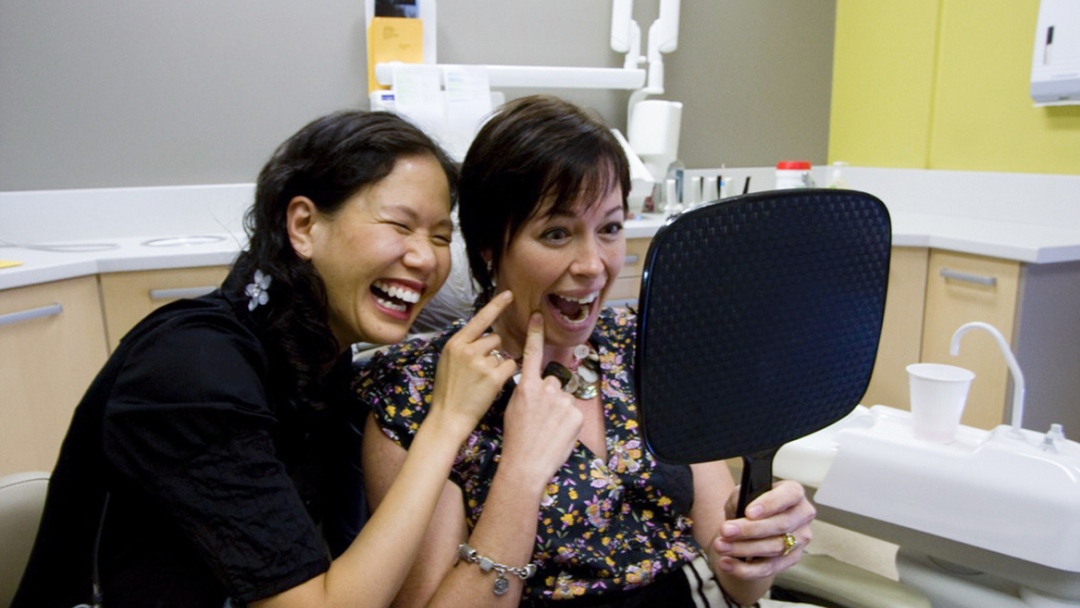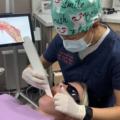Are you a senior considering dental implants? If so, you may have some questions about the feasibility and safety of such a procedure. You’re not alone; many older adults are asking themselves “Am I too old for dental implants?” Fortunately, with advances in technology and medical care, seniors can now enjoy the benefits of dental implants safely and effectively. In this guide, we will discuss why age is no longer an obstacle to getting dental implants, their potential risks and benefits, as well as other important factors to consider when deciding if they’re right for you.
Dental implants are designed to replace missing teeth or stabilize dentures that don’t fit securely. They provide a strong foundation for natural-looking artificial teeth that look just like real ones. As people get older, however, it’s common for them to experience bone loss due to age-related health issues such as osteoporosis or gum disease. This can make implant placement more challenging because the jawbone must be strong enough to support the implant post. Despite these challenges, it is possible for seniors over 70 years of age to receive implants successfully with careful planning and monitoring from their dentist or oral surgeon.
By understanding how age affects your eligibility for dental implant surgery and being aware of any potential risks associated with the procedure, you can make an informed decision on whether or not dental implants are right for you. The information contained in this article will help equip you with knowledge needed to discuss your options with your healthcare provider and decide if dental implants are an appropriate solution for restoring your smile.
The Basics Of Dental Implants
Dental implants are an increasingly popular way to replace missing teeth. They involve a titanium post being placed into the jawbone and then attaching an artificial tooth in place of the missing one. Bone loss, which can occur when you lose a tooth, is not an issue with dental implants since they provide support for your remaining natural teeth.
Dental implants are considered safe and effective for most people regardless of age so long as there is sufficient healthy bone tissue present in the jaw area where the implant needs to be inserted. It’s also worth noting that while dental implants may cost more than traditional dentures initially, they tend to last longer meaning lower costs over time compared to many other treatments associated with replacing lost teeth.
Age-Related Factors To Consider Before Getting Dental Implants
When considering dental implants for seniors, age-related factors must be taken into account. Bone density naturally decreases with aging, and may not support implant treatments in some cases. Therefore, before getting dental implants, a senior should consult their dentist to determine if they are suitable candidates for the procedure. The dentist can assess the patient’s bone structure and create an appropriate treatment plan accordingly. In addition, they will also evaluate any health conditions that could affect the success of the implant process or put them at risk during surgery.
Age is just one factor to consider when looking into dental implants as an option for replacing missing teeth. Other important considerations include overall oral health, budget constraints, and lifestyle habits such as smoking and drinking alcohol. Ultimately, it’s best to discuss all these issues with your dentist so that you can make an informed decision about whether dental implants are right for you.
Bone Density And Bone Growth Factors For Dental Implants
Growth factors are important when it comes to determining whether or not a senior is an appropriate candidate for dental implant surgery. Bone health and density play the biggest roles, as they determine how well your body can support the implants.
In order for a successful outcome, there must be sufficient bone in both quantity and quality within the recipient area. This means that there should be adequate bone tissues present with adequate thickness and volume to ensure proper integration of the implants into your jawbone.
If these criteria aren’t met, then additional procedures such as bone grafts may need to be performed before dental implant surgery can take place. Depending on individual circumstances, some seniors may even opt out of getting dental implants if their bone growth isn’t ideal enough.
Bone Loss And Jawbone Determine Implant Eligibility
Seniors considering dental implants should be aware that bone loss is a critical factor in determining implant eligibility. Without adequate jawbone, the adjacent teeth may not provide enough support and stability for the implant to properly integrate with the existing tissue. When evaluating a potential dental implant patient, dentists will assess the presence of healthy bone tissue around the area where an implant would be placed. If there is too much bone loss or any other issues preventing successful integration, then alternative treatments are likely recommended over implants.
Key Factors In The Success Rate Of Dental Implants For Seniors
When considering dental implants for seniors, there are key factors that influence the success rate of the implant placement. These include whether or not a bone graft is required to provide additional support; the overall health of the patient; and the number and position of any long-term missing teeth. Bone grafts can help ensure successful integration of an implant into existing jawbone tissue. Therefore, if a bone graft is necessary, it should be performed before placing the implant itself.
Patients with poor oral hygiene may also experience lower rates of success when receiving dental implants due to plaque buildup around the gums, which can lead to infection and decrease chances for successful integration. Additionally, denture wearers must make sure their prosthetic fits properly as ill-fitting dentures can cause excessive pressure on implant attachments leading to potential failure over time.
Medical Conditions That Can Affect Dental Implant Procedures
When considering dental implants for seniors, implant candidates must be aware of any medical conditions that could affect the procedure. Elderly patients should consult with their dentist and physician to discuss if they are suitable implant candidates based on factors such as overall health, existing oral health issues, and bone loss in the jawbone.
Certain medical conditions can increase the risk of a dental implant failing or becoming infected. These conditions include diabetes, high blood pressure, heart disease and autoimmune disorders like rheumatoid arthritis. People who take medications such as steroids or immunosuppressants may also experience an increased risk of complications from a dental implant procedure. It’s important for elderly patients to inform their doctor about all pre-existing medical conditions before undergoing a dental implant procedure so that proper precautions can be taken to minimize risks associated with these conditions.
Oral Health Requirements For Ideal Candidates
Dental implants are an excellent solution for seniors who have lost teeth due to age-related wear, trauma or disease. However, not all elderly people meet the oral health requirements necessary for dental implant placement. An ideal candidate must possess:
- Healthy gums and supportive jawbone structure
- Adequate bone volume in the area of implant placement
- No active gum infection or history of periodontal disease
- Reasonable expectations about treatment outcomes and overall results.
For those with insufficient bone in the site of implantation, a bone graft may be used to add growth factors that will help stimulate new tissue to support the dental implant. Without sufficient supporting structures, there is a risk that the implant could become loose or fall out over time. It’s important for seniors considering implants to discuss their personal needs with a qualified dentist before making any decisions about tooth replacement options.
Arch Of Teeth, Artificial Tooth Root And Other Considerations For Implant Placement
When it comes to dental implants for seniors, there are a few factors that must be taken into consideration. The first is the arch of teeth – whether natural or artificial – which will determine where an implant can be placed and how many implants are needed. Artificial tooth roots made out of titanium may also need to be inserted in order to support dentures or bridges. An implant studio should be consulted prior to any procedure as they have specialized experience with these types of procedures.
Implant supported dentures and bridge replacements require prosthetic teeth connected by either an implant supported bridge or clip retained bridge. In this case, multiple implants will need to be placed around the missing teeth area in order for the bridge or denture to remain stable. Implants provide additional stability and support when compared to traditional bridgework and dentures, allowing patients greater freedom from discomfort due to ill-fitting devices. With proper care and maintenance, dental implants can last a lifetime if properly cared for and monitored regularly by a dentist.
It is important that seniors consider all their options before deciding on what type of replacement option works best for them since each individual’s mouth varies in shape, size and overall health condition. Consulting with a qualified implant specialist who has experience dealing with senior patients is highly recommended so that you can get accurate information about your particular situation.
Identifying Excellent And Poor Candidates For Implant Treatment Processes
When it comes to dental implants, there are excellent and poor candidates. Excellent candidates for implant treatment processes include healthy people who have sufficient bone density in the jaw area. These patients can benefit from an implant-retained denture that provides a secure fit and improved success rate over traditional bridges or removable dentures.
Poor candidates for implant treatments may include those with advanced periodontal disease, insufficient bone mass, uncontrolled diabetes or any other medical condition that would interfere with successful healing. It is important for seniors to consult their dentist before opting for dental implants as the procedure won’t be suitable if they don’t meet the criteria above.
What To Expect With Hybrid Bridges, Clip Retained Bridges And Implant Supported Bridges
Hybrid bridges are a great option for seniors looking to replace several missing teeth. These types of bridges involve attaching crowns to the abutment teeth with metal clasps, and placing an artificial tooth in between them. The bridge is then held together by dental implants that connect the two ends of the bridge. During oral surgery, these implants are placed directly into the jawbone and act as anchors for the bridge.
Clip retained bridges are another type of implant-supported denture used to replace multiple missing teeth. This procedure requires four or more implants which are inserted into the jawbone during oral surgery and topped with special clips. These clips can be used to secure false teeth onto the dental implants, providing greater stability than traditional bridgework. Implant supported bridges provide a permanent solution for replacing multiple missing teeth since they do not require removal like removable dentures would need. They also have higher success rates compared to other forms of replacement because they integrate securely with your existing bone structure.
Seniors considering dental implants should discuss their options with their dentist who will be able to assess whether they’re suitable candidates for this type of treatment and recommend what’s best suited for their particular case.
Alternative Treatments To Bone Grafts For Adequate Bone Structure Support
Moving on from hybrid bridges, clip retained bridges and implant supported bridges, there are alternative treatments to bone grafts for seniors who need adequate bone structure support. Dental treatments exist that don’t involve the use of bone grafting or other invasive procedures when placing a dental implant as an artificial tooth root.
Before any treatment is done, your dentist will assess your needs in order to create a comprehensive orthodontic treatment plan. If you have enough jawbone mass to support the placement of implants without needing additional bone structure, then dentists may recommend implant-retained overdentures instead of traditional dentures. Implant-retained overdentures utilize two to four small titanium posts and provide more stability than current denture options available. This type of dental prosthesis allows patients greater comfort while eating and speaking with fewer restrictions than they previously had with their existing denture.
Impact On Long Term Health And Quality Of Life With Implants
When considering dental implants, it is important to consider the potential impact on long-term health and quality of life. Failure of an implant can cause additional oral health problems that could have been avoided with proper care. Additionally, there may be a link between certain cardiovascular diseases and tooth loss or failure of dental implants in some patients. Therefore, for those who are at risk for heart disease or other serious conditions, having healthy teeth might be more beneficial than getting cosmetic treatments like dental implants.
For seniors in general good oral hygiene habits should be maintained regardless if one chooses to get implants or not. This includes regular brushing and flossing as well as visiting the dentist regularly for checkups and cleanings. A generally healthy person in their senior years should have no problem receiving dental implants but they should talk to their dentist first about any current medical conditions or medications that might affect their ability to heal properly after surgery.
Achieving A Healthier Life With Proper Care And Maintenance Of Your Implants
Proper care and maintenance of your implants is essential for ensuring a healthier life. With proper hygiene, these dental devices can last for many years with the right precautions in place. It’s important to visit your dentist regularly to monitor the progress and health of your implants. Regular cleanings are necessary to avoid gum disease or any other issues that may arise from implant failure.
Maintaining good oral hygiene habits such as brushing twice daily and flossing at least once per day will help increase the life expectancy of your implants while also keeping them functioning properly. Also, eating a balanced diet rich in minerals, vitamins and proteins is key to long-term success with implants. Following these steps should ensure you have a normal life without worrying about implant failures.
Dental Implants Can Be A Great Option For Seniors
In conclusion, dental implants are a great option for seniors and can have a significant impact on long term health and quality of life. It is important to understand the age-related factors that could influence your decision before getting implants, such as growth factors and medical conditions that may affect the success rate of implant placement. Additionally, alternative treatments like clip retained bridges or hybrid bridges should be explored if bone grafts are not an option. Finally, proper care and maintenance of your implants will help you achieve a healthier life with improved oral function. As an elderly person considering dental implants, it’s important to weigh all these factors carefully. With the right approach and professional guidance, you’ll get years of use out of your new teeth!
If you’re a senior considering dental implants, don’t let age hold you back from getting the smile you deserve. Advances in technology and medical care have made it possible for seniors over 70 to safely and effectively receive dental implants. If you’re unsure whether dental implants are right for you, consult Smile Design Studio, we can assess your bone structure, evaluate any health conditions, and create a treatment plan. With careful planning and monitoring, dental implants can be a great solution for restoring your smile. Don’t wait, schedule an appointment with us today to discuss your options.









